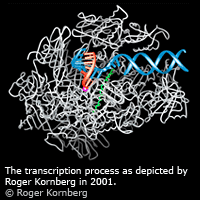 PCR is a method by which a few fragments of DNA can be duplicated into millions in a couple of hours. This makes PCR a very useful method in forensic science, as it means that very small amounts of DNA could be enough to identify a person. PCR was invented by Kary Mullis, one of two Nobel Laureates in Chemistry in 1993. If you play the game below, you will be able to learn more about PCR. Also, a must for HL Biology and Chemistry students is the 30 min lecture by Roger D. Kornberg, the winner of the 2006 Nobel Prize for Chemistry for his studies of the molecular basis of eukaryotic transcription.
PCR is a method by which a few fragments of DNA can be duplicated into millions in a couple of hours. This makes PCR a very useful method in forensic science, as it means that very small amounts of DNA could be enough to identify a person. PCR was invented by Kary Mullis, one of two Nobel Laureates in Chemistry in 1993. If you play the game below, you will be able to learn more about PCR. Also, a must for HL Biology and Chemistry students is the 30 min lecture by Roger D. Kornberg, the winner of the 2006 Nobel Prize for Chemistry for his studies of the molecular basis of eukaryotic transcription.Click here to play the DNA game
Click here for the lecture (real player required)
Click here for an interview with Roger D. Kornberg after he won the prize
Click here visit the Nobel Prize home page to see who won the other awards
CLick here to play some other games related to the Nobel Prizes



how the hell do u get the science to the sciece rotations
ReplyDeleteYear 10 Rotations on Monday
ReplyDelete1a LAFO BIO
1b SUBU BIO
2a GALA CHEM
2b CAPR CHEM
3a CLBN PHYS
3b ANRO PHYS
Year 11 Rotations on Monday
1a LOMA CHEM
1b DAST CHEM
2a CLBN PHYS
2b IAJO PHYS
3a JOME BIO
3b ADPA BIO
Is that what you wanted?